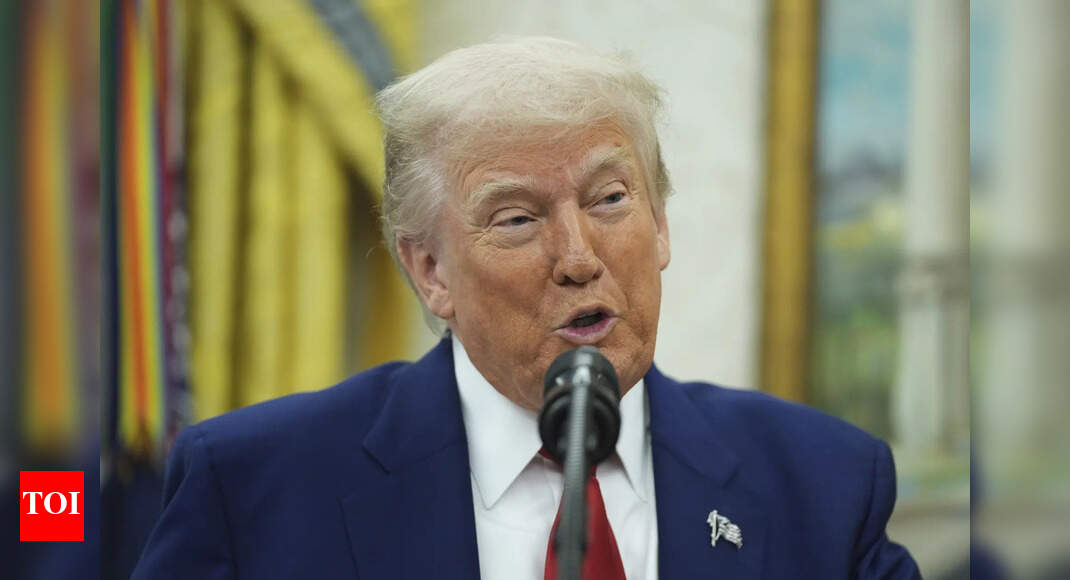Trump’s Tariff Battle: Appeals Court Grants Temporary Stay Amid Controversial Trade Rulings
Trump’s Tariff Turmoil: Court Rulings and Economic Implications
In a dramatic twist, former US President Donald Trump received temporary approval to continue his controversial tariff policies – a decision that has significant implications for international trade, domestic businesses, and overall economic health. Just a day after a federal trade court ruled that Trump had overstepped his authority by imposing sweeping tariffs on foreign imports, the US Court of Appeals for the Federal Circuit granted a stay, allowing the tariffs to remain intact while the White House appeals the ruling. This blog post will unravel the complexities behind this developing story, delve into the implications of these tariffs, and explore what happens next.
A Rule from the Court: What Happened?
The recent ruling by the US Court of International Trade (CIT) came as a substantial blow to Trump’s administration, denouncing the invocation of the International Emergency Economic Powers Act (IEEPA) as unlawful. The court asserted that invoking such emergency powers was unjustified, especially considering that America has maintained trade deficits for nearly half a century – hardly an unexpected crisis. This was particularly relevant in the context of Trump’s “Liberation Day” tariffs which were introduced in 2023. The tariffs imposed ranged dramatically, with some surcharges reaching up to 50 percent on imports.
This tempest is compounded by the fact that Trump’s tariff strategies face challenges from at least seven lawsuits. Significant pushback has surfaced not just from trade groups, but also from individual states and small businesses that fear the adverse effects of escalating import costs.
Broader Economic Impact of the Tariffs
- Supply Chain Chaos: Trump’s tariffs have already begun to rattle international markets, making consumers sensitive to price increases.
- Inflation Concerns: Increased tariffs typically lead to higher prices for American consumers and businesses, stoking inflation concerns across various sectors.
- Global Trade Relationships: Imposing tariffs on imports not only affects US businesses but can ignite retaliatory tariffs from other countries, complicating trade relationships.
If the tariffs are eventually lifted, analysts predict that US economic growth might rebound notably; economists at Capital Economics forecast a growth rate of 2% annually by late 2025, up from a previous forecast of 1.5%. Easing inflationary pressures could be a silver lining for both consumers and businesses.
The Potential Repercussions: What Lies Ahead?
The path forward remains uncertain as the case continues to evolve through the courts. Crucial questions linger on whether the appeals court will uphold the original ruling, which would have far-reaching implications for the future of Trump’s tariffs and the broader economic landscape.
Moreover, if the IEEPA tariffs are ultimately abolished, businesses could potentially receive refunds for tariffs already paid, a scenario that Peter Harrell from the Carnegie Endowment highlighted in a recent social media post. Yet, such refunds would likely be delayed as the government is expected to hold off on repayments until all appeals are settled.
Domestic and International Responses
The polarized political landscape surrounding Trump’s tariff strategies contributes to a tug-of-war between economic rationale and political agendas. Many industry leaders and economic analysts argue for a more balanced approach to international trade, while supporters of the administration advocate for protecting domestic industries from what they view as unfair foreign competition.
“The reason that he chose IEEPA was he thought he could do this unilaterally without much oversight by Congress,” remarked Jeffrey Schwab, a senior counsel for the Liberty Justice Center, representing the interests of small businesses affected by the tariffs. “The court saw through that.”
With implications that stretch beyond the courtroom, the ongoing saga of Trump’s tariffs raises critical discussions about trade policy in the US, an area that continues to shape economic narratives both domestically and internationally. Moving forward, the outcome of these legal battles could either reinforce or dismantle the framework of Trump’s trade policies, with implications reaching well into the Biden administration’s strategy.
Conclusion
As the situation develops, all eyes are on the appeals court, which holds the pendulum of international trade in its hands. With economies struggling to stabilize post-pandemic, the delicate balance between protecting domestic interests and fostering global trade partnerships takes center stage. Stay tuned as we monitor the latest developments in this unfolding story.

![<pre>PayloadTooLargeError: request entity too large<br> at readStream (/var/app/current/node_modules/raw-body/index.js:163:17)<br> at getRawBody (/var/app/current/node_modules/raw-body/index.js:116:12)<br> at read (/var/app/current/node_modules/body-parser/lib/read.js:79:3)<br> at jsonParser (/var/app/current/node_modules/body-parser/lib/types/json.js:138:5)<br> at Layer.handle [as handle_request] (/var/app/current/node_modules/express/lib/router/layer.js:95:5)<br> at trim_prefix (/var/app/current/node_modules/express/lib/router/index.js:328:13)<br> at /var/app/current/node_modules/express/lib/router/index.js:286:9<br> at Function.process_params (/var/app/current/node_modules/express/lib/router/index.js:346:12)<br> at next (/var/app/current/node_modules/express/lib/router/index.js:280:10)<br> at expressInit (/var/app/current/node_modules/express/lib/middleware/init.js:40:5)</pre>](https://ouat.co.in/wp-content/uploads/2025/06/2500-768x403.jpg)




